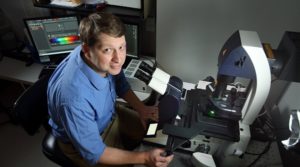Cyrus “David” Mintz
 Dr. CYRUS “DAVID” MINTZ is the current Division Chief for Neurosurgical Anesthesiology and the third occupant of the Thomas and Dorothy Tung Chair. He was born and raised in Miami, Florida, and is the son of a theoretical physicist and a German language teacher who became an organic chemist later in life. Dr. Mintz showed an early interest in the life sciences, winning both an American Heart Associate Scholarship and the Beverley B. Jones Prize for the Biological Sciences as a Senior at Ransom Everglades High School. He went on to a concentration in neuroscience at Brown University, where he earned departmental honors for work on visual processing conducted in the laboratory of Dr. Michael Paradiso. During his undergraduate years, Dr. Mintz also acquired a love of acute care medicine while working as an EMT for the campus ambulance service. Dr. Mintz enrolled in the combined MD/PhD at the Mount Sinai School of Medicine, where he was a graduate student in the laboratory of Dr. Deanna Benson. He completed doctoral work on the molecular mechanisms underlying the connection between the cell membrane and the cytoskeleton in growing neurons and also studied fetal alcohol toxicity. These experiences gave rise to a life-long interest in translational science related to the developing brain.
Dr. CYRUS “DAVID” MINTZ is the current Division Chief for Neurosurgical Anesthesiology and the third occupant of the Thomas and Dorothy Tung Chair. He was born and raised in Miami, Florida, and is the son of a theoretical physicist and a German language teacher who became an organic chemist later in life. Dr. Mintz showed an early interest in the life sciences, winning both an American Heart Associate Scholarship and the Beverley B. Jones Prize for the Biological Sciences as a Senior at Ransom Everglades High School. He went on to a concentration in neuroscience at Brown University, where he earned departmental honors for work on visual processing conducted in the laboratory of Dr. Michael Paradiso. During his undergraduate years, Dr. Mintz also acquired a love of acute care medicine while working as an EMT for the campus ambulance service. Dr. Mintz enrolled in the combined MD/PhD at the Mount Sinai School of Medicine, where he was a graduate student in the laboratory of Dr. Deanna Benson. He completed doctoral work on the molecular mechanisms underlying the connection between the cell membrane and the cytoskeleton in growing neurons and also studied fetal alcohol toxicity. These experiences gave rise to a life-long interest in translational science related to the developing brain.
During medical school Dr. Mintz developed a clinical interest in anesthesiology, which quickly resulted in a complementary research interest related to the potentially harmful effects of anesthetics on the developing brain. He took a new approach to the problem by investigating the effects of anesthetics on the development of brain circuitry. Dr. Mintz went on to residency at the Columbia University College of Physicians and Surgeons, where he was inducted into the Apgar Scholar’s Society and selected as a chief resident. He completed further training as a clinical fellow in neurosurgical anesthesiology with Dr. Eric Heyer and as a T32 research fellow in the lab of Dr. Neil Harrison. During this time Dr. Mintz further developed his work on anesthetic neurotoxicity, which was recognized by awards at national meetings including the American Society for Anesthesiology, the Association of University Anesthesiologists, and the Post Graduate Assembly in Anesthesiology. Dr. Mintz started his independent laboratory at Columbia with mentorship and support from Dr. Margaret Wood and Dr. Charles Emala.
After a brief time on the faculty at Columbia, Dr. Mintz was recruited to the Johns Hopkins University School of Medicine by Dr. John Ulatowski and Dr. Marek Mirski, the first Tung Professor. He joined the Division of Neurosurgical Anesthesiology in the Department of Anesthesiology and Critical Care Medicine. At Hopkins, Dr. Mintz continued his research on anesthetic toxicity in the developing brain, which resulted in a junior faculty award by the Association of University Anesthesiologists and grant funding from the National Institute of General Medicine. He has since branched out into related work investigating the effects of sedatives on brain development and the effects of anesthetics on the microbiome and the immune system. Dr. Mintz founded a fellowship in neurosurgical anesthesiology in order to enhance the training of new clinicians and encourage scholarship in this area. He began work on a new resident curriculum in neurosurgical anesthesiology and has garnered four resident teaching awards, including twice winning the Charles Beattie Award for best overall teacher. In partnership with Dr. Laurie Antonik, Dr. Mintz helped refine and reorganize clinical operations in the division, and he has taken on a departmental role as a member of the clinical operations group under Dr. Antonik’s leadership. During his time at Hopkins, Dr. Mintz has had the opportunity to further hone his clinical skills in neurosurgical anesthesiology with guidance and mentorship from Dr. Allan Gottschalk, the second Tung Professor, and with Dr. Tommy Tung himself. Dr. Mintz remains very grateful for Dr. Tung’s kindly encouragement and his seemingly endless store of clinical wisdom, as well as for the generosity of Dr. Tung’ gift to the Neurosurgical Anesthesiology Division.